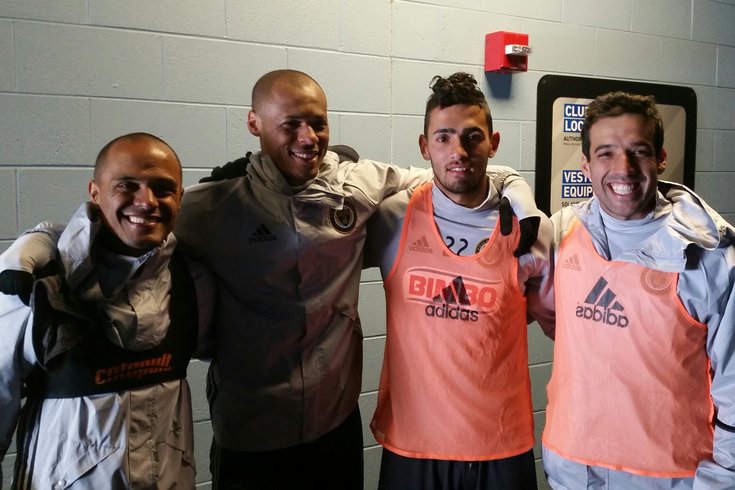
March 03, 2016
 Kevin Kinkead/for PhillyVoice
Kevin Kinkead/for PhillyVoice
The Union's Brazilian contingent (from left): Fabinho, Anderson Conceicao, Leo Fernandes, and Ilsinho.
Why are Brazilians always so happy?
It's 39 degrees and feels like Fargo down in Chester, but the Union's South American contingent is laughing and joking like they're on the Copacabana beach.
The squad includes Fabinho, Anderson Conceicao, Ilsinho, and Leo Fernandes*.
Leo gets an asterisk because he was born in Brazil but moved to New York at a young age. He speaks English and Portuguese. Anderson speaks Spanish and Portuguese. Ilsinho speaks Portuguese and probably some Russian. Fabi knows Portuguese and now communicates clearly in English after three years in the United States.
"I’m so happy because last year we had just me and Fred," Fabinho told us after Wednesday's morning session. "This year, I’m happy with Ilsinho, Anderson, and Leo coming back. I’m happy not just about these guys, but the other guys we have this year are so good. I think we have a big chance this year to make the playoffs or finally get the U.S. Open Cup."
That paragraph would have required a translator last year, but English classes have really paid off for the Union's starting left back.
"I think, the one year that I’ve been away, Fabinho’s English has improved tremendously," Fernandes laughed. "I don’t think he gave a full English interview the last time I was here. It’s great, especially with guys like Ilsinho and Anderson, they’re so experienced. They’ve played all over the world, in Europe, and it just helps the group tremendously."
Ilsinho comes off as a bit of a comedian. We asked Fabinho, to ask him, how he ended up in Philadelphia.
"Fabinho called me and said, ‘we need you, come to my house,'" the midfielder quipped. "And I said, ‘without a doubt, I’ll come over.’"
Top 10 best Winter Transfers:
— MLS Transfers (@MLSTransfers) March 2, 2016
#4 Ilsinho#MLSTransfersPredictions
Fabinho and Ilsinho knew each other from their days in Brazil. Fabi turned pro with Coritiba in 2005. Ilsinho began in 2006 with Palmeiras, then moved to Sao Paolo before joining European powerhouse Shakhtar Donetsk.
"I stayed seven years in Ukraine, and I always followed MLS," Ilsinho said. "I saw that the league was growing and I always wanted to come here one day."
Ilsinho shared the field with superstars in Ukraine. He lifted the UEFA Cup in 2009 with Croatia captain Dario Srna and Romanian international Razvan Rat. His compatriots Willian, Douglas Costa, and Fernandinho would later transfer to Chelsea, Bayern Munich, and Manchester City.
The team was half Brazilian and half European, and it was damn good.
"That experience was great," Ilsinho said. "In two or three years, we were able to form a competitive team in the Champion's League, and everyone wants to play Champion's League. We made it pretty far in that tournament, and it was nice to play with all those Brazilians. Here, it’s the best thing that can happen, to have one or two Brazilians, because that helps me to transition. It helps me learn English, it helps me with moving and everything."
Sadly, politics interfered with soccer when tensions between Ukraine and Russia boiled over. Donetsk, located near the Russian border, bore the brunt of the conflict and became a strategic location for the warring sides. Shakhtar was forced from the Donbass Arena and played their home games in the western city of Lviv, more than 700 miles away.
"There were some tough times when the war was happening," Ilsinho explained. "The city got completely destroyed. They lost the stadium and the training facility. And during the season, we would always play away, we never played at home. Before the war, things were good, everything was good and I enjoyed my time there.
.@Leo_Fernandes22 makes the score 2-0 ⚽️⚽️ pic.twitter.com/drDEAarXhj
— Philadelphia Union (@PhilaUnion) February 21, 2016
Anderson is an imposing figure but seems more reserved than his other countrymen. Similar to Ilsinho, he kept an eye on America and made the jump when the opportunity arose.
"I think the MLS season is very competitive," the center back told us, via Fabinho. "I wanted to enjoy something different, and I noticed that everyone in Brazil wants to or has the vision to make the transition over to the U.S. It’s not possible for every Brazilian, but I’m happy to be here."
Conceicao is a journeyman defender who played in Spain but spent the majority of his career in Brazil's lower divisions. The Union will be the 11th team he's played for since 2009, but his recent spell with America Mineiro was his most successful, and Philly's front office was paying attention.
"They’ve been following me for a year and a half in the Brazilian league," Anderson said. "They liked what they saw of me, and this year, we were able to make it work."
Communication is key for an organized backline, so it's critical that Fabinho is there to help Anderson learn team tactics and shape.
"Jim (Curtin) said for me to help him," Fabi added. "I talk every day with him, tell him what Jim likes and what he has to do on the field. I think right now, he’s okay. I think in the next few days, he’ll be understanding everything."
There's a fifth Portuguese speaker on the team, and that's goalkeeper Matt Jones.
"The first time I met him, I didn’t think he’d speak Portuguese at all," said Fernandes. But actually Fabinho was the first one to talk with him, and he was like, ‘hey, Matt speaks Portuguese,’ and we were like, ‘welcome to the group.’"
Jones picked up the language after six years of soccer in Portugal.
"They’ve still got their Brazilian accents, which is always a challenge, but I’m pretty comfortable in Portuguese," Jones said in a separate interview. "All joking aside, it's very useful, especially for people like Anderson now who’s come in, he doesn’t speak English, and I’m able to communicate with him. Obviously, being a goalkeeper, that’s one of the most important things. As long as there’s a direct channel of communication there, it’s beneficial for everyone."
For manager Jim Curtin, the understanding off the field carries over onto the pitch.
"It's helpful," Curtin said. "I think it needs to be said that no matter what language you speak, soccer is pretty universal. But the fact that our Brazilian players are such good guys, and open, and good teammates, I think makes the transition even easier. There's a bond between them. They're always laughing, always joking, but they've also integrated to the entire group.
"Yes, Anderson and Ilsinho don't speak English well. They understand a few things, but with my broken Spanish we can still communicate. That part is strong. The messages are getting through to them. I never thought Fabinho would be a translator for me. But actually, to be honest, the University of Pennsylvania deserves a ton of credit in our English classes. It's been unbelievable some of the strides these guys have made in terms of communication. On the field, it matters. Fabi is talking to the backline, telling them when to step and drop, and we're kind of laughing on the sidelines because as recently as two years ago he thought the words 'position' and 'possession' meant the same thing."